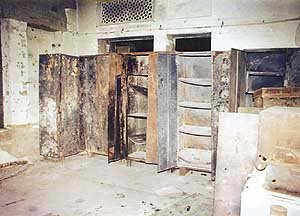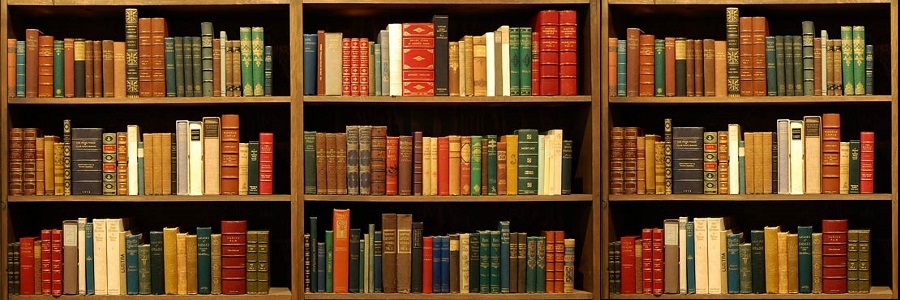Sikh Library
For the benefit of the Sangat we have provided one of the largest and richest Sikh library collections.
Discover Sikhism by browsing through material selected from our Library in an easily searchable and readable format. The Library may seem a little daunting at first (there are so many great books to read) – but don't be put off.
Since we started the library, there has been huge interest from all those wanting to know more about Sikhi.

Sri Guru Granth Sahib Ji - The Sikh holy scripture, which has words written by the Sikh Gurus personally.
The above Saroop is a padd-chhed Guru Granth Sahib (split words) and is used to learn from. The authentic originals are written in larivaar (continuous writing).
The advantages of digital libraries means easy and rapid access of books and articles.
Traditional libraries are limited by storage space; digital libraries have the potential to store much more information, simply because digital information requires very little physical space to contain it. The user of a digital library need not to go to the library physically; people from all over the world can gain access to the same information, as long as an Internet connection is available. A major advantage of digital libraries is that people can gain access 24/7 to the information.
The user is able to use any search term (word, phrase, title, name, subject) to search the entire collection. Digital libraries can provide very user-friendly interfaces, giving click able access to its resources.
Whereas traditional libraries are limited by storage space, digital libraries have the potential to store much more information, simply because digital information requires very little physical space to contain them and media storage technologies are more affordable than ever before.

You now have a unique opportunity not only to read and learn from great Sikh scholars (and others) on what it means to be a Sikh but also to progress and study Gurbani and the Sikh Guru's teachings first hand.
In Discovering Sikhism, it is vital that one learns and studies Gurbani (writings of the Sikh Guru's) - Gurbani is unique across all religions in that the Sikh Guru's personally wrote their teachings, which were compiled by the 5th and 10th Guru Ji's in what is now known as the Sri Guru Granth Sahib Ji.
We have many great books that will teach you Gurmukhi (Punjabi script or writing), Santhiya (learning the correct pronunciation of Gurbani), Steeks and Teekas (which provide commentary and detailed analysis behind the messages in Gurbani).
Although we have many, many fine items, our most notable is an extremely rare old hand written Sri Guru Granth Sahib encased in gold which belonged to Baba Deep Singh Ji (Sri Guru Granth Sahib Ji - Baba Deep Singh Ji).
For best success in learning Gurbani, set a schedule and stick to it. Expect that it is going to take weeks to years to master Gurbani depending on your ability and native tongue. You have this lifetime. Make use of it.
Sikh Reference Library

Sikh Reference Library entrance |
The Sikh Reference Library was a repository of over 1,500 rare manuscripts located at Sri Harmandir Sahib (Golden Temple) at Amritsar, Punjab which was destroyed during the 1984 Sikh Genocide by the Indian army and hindu led government.
In 1984, after the attack and murder of innocent Sikh civilians and worshippers, the library's contents were confiscated by the Central Bureau of Investigation (CBI) and the empty building allegedly burned to the ground by the Indian Army.
In recent years the Shiromani Gurdwara Parbandhak Committee (SGPC) has attempted to recover the looted material but has not yet recovered substantial materials.
To date, the status of library manuscripts and artifacts is unclear; the vast majority remain in the hands of the government, a few office files and passports were returned, and as many as 117 items were destroyed for being "seditious" materials.
Origin
The Sikh Reference Library was established by the SGPC with a resolution dated October 27, 1946.
The library had its roots in a meeting of the Sikh Historical Society under the presidency of Princess Bamba on February 10, 1945 at Khalsa College, Amritsar which established the Central Sikh library.
The Central Sikh library was then folded into the Sikh Reference Library.
Historical Materials
Before its destruction, the library contained rare books and manuscripts on Sikh religion, history, and culture. It also contained handwritten manuscripts of the Guru Granth Sahib and Hukumnamas containing signatures of Sikh Gurus.
The library also held documents related to the Indian Independence Movement.
Destruction
According to the Indian Army white paper on Operation Blue Star, the library was destroyed on the night of June 5, 1984 in the midst of a firefight. However, according to V. M. Tarkunde, the library was still intact on June 6 when the Army had gained control of the Golden Temple, and was in fact burned down by the army at some point between June 6 and June 14.
Although the Indian Army has maintained that the library's contents were completely destroyed on June 5, the SGPC has contradicted their version of events.
By using witness accounts, the SGPC has alleged that material from the library was taken in gunny sacks on military truck to Amritsar's Youth Club, a temporary office of the CBI, and the empty library was burned by the army afterwards.
At that location, the CBI catalogued the materials until September 1984, when in light of a Sikh convention being held in the city, the library's contents were moved to an undisclosed location.

The destruction of the Sikh Reference Library was a systematic and deliberately organized attempt to destroy Sikhs,
their religion and its literature by a ruthless Indian hindu led government.
Coverup
In 2003, Ranjit Nanda, a former inspector for the Central Bureau of Investigation, (CBI) turned whistleblower and revealed he was part of a five member team which scrutinized the documents at the CBI's makeshift office at Amritsar's Youth Club.
Ranjit Nanda revealed that officials from his department were "desperately looking for a purported letter written by Indira Gandhi, the then Prime Minister, to Jarnail Singh Bhinderanwale", and reported seeing letters from the other leaders addressed to Jarnail Singh Bhinderanwale.
Manjit Calcutta, a former secretary of the SGPC, corroborated Nanda's version of events but further alleged that the army set the library "on fire in desperation when it failed to find the letter".
Nanda further confirmed the SGPC's version of events by describing how after inspecting each book and manuscript the CBI packed the documents into 165 numbered gunny sacks and bundled the material into waiting army vehicles because of a meeting of Sikh high priests taking place at the time. He also showed a letter from his superiors commending his work "during examination of documents from SGPC ".

What happened to historical manuscripts, books and artifacts after the Library was looted and burned? |
Efforts To Recover The Material
Since 1988, the SGPC has written to the Central Government asking for the return of the material taken by the CBI but has only received minor office files.
On May 23, 2000 George Fernandes wrote to the SGPC Secretary, Gurbachan Singh Bachan, and acknowledged that the Indian Army had taken the books and other documents from the Sikh Reference Library and handed them over to the CBI.
George Fernandes asked him to refer the matter to the Ministry of Personnel, Public Grievances and Pensions, whose jurisdiction the CBI falls under. In a visit to Jalandhar, Punjab Fernandes announced that the CBI had destroyed 117 "seditious" documents from the material taken from the Sikh Reference Library.
On March 25, 2003, A. P. J. Abdul Kalam made assurances that the books, documents, and manuscripts would be returned, however he took no further action.
In April 26, 2004, the Punjab and Haryana High Court ordered the Central Government, Government of Punjab, and the CBI to return the "valuables, books, scriptures, paintings, etc, that were seized from the Golden Temple during "Operation Bluestar" in 1984".
In February and May 2009, A. K. Antony, defense minister of India, claimed in parliament that the Indian Army no longer had any material taken from the library. Various members of parliament and the SGPC criticized him for "misleading parliament".









